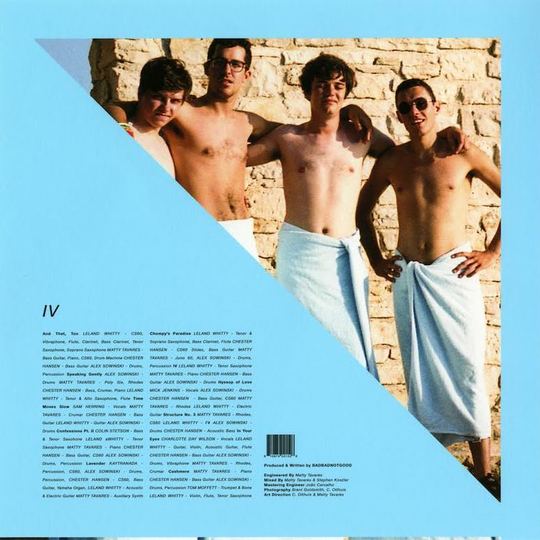The meteoric rise of BADBADNOTGOOD can be traced to one conceit: the convergence of high-brow jazz with low-brow culture, i.e. hip hop, video games, pig masks. For their first two albums, any conversation about the trio began and ended there, with Alex Sowinski’s head-bobbing rhythm, Matthew Tavares’s mad virtuosity, and Chester Hansen’s mesmeric bass lines confirming at once their immersion in both worlds. Once the boys landed on a label, though, much of the playful dabbling ceased – and while III launched an intense ambush on the record-buying public, BBNG had sidelined the quirks that fueled their fame in the first place.
Oof. There’s a bookish intro if I ever wrote one. But already the crux of IV emerges. Before, you could just rant about BBNG as the contrarian crew that slammed beats into yr ears, and trade the name around as subcultural capital. However, as the trio – now a quartet with a revolving door of collaborators, most notably Ghostface Killah last year – fleshed out their repertoire, the sound had to grow and complicate itself in turn. Turns out, you can judge a book by its cover: the cozy, full-colour snap of the four key members in bath towels, as if they’re lounging in a spa while laying down tracks, depicts the luxurious aesthetic of IV to a tee. This stark re-branding begs the question: is BBNG still BBNG? Me, I’m about to suggest that they’re not – the sneaky interplay that once crackled at the core has fizzled out, as the band drift completely to austere gold.
Now, I’m not saying that complexity is inherently bad. BBNG were already attacking new genres and textures with gusto on III, and the pursuit continues here. The dazzling, humming array of synths and reeds that gild the sylvan opener 'And That, Too' and the punchier, crystalline 'Speaking Gently' promise a degree of nuance higher than anything the blokes have ever written for themselves before. But they also suggest a truce – rather than the thrilling bouts that the trio used to unleash on the fly, BBNG glide through the motions as if there’s no fight left to wage.
But BBNG really shuffle their identity on the collaborative songs, where guest musicians and producers enter the fold. Both 'Time Moves Slow' and 'In Your Eyes' recreate Sixties soul with astonishing accuracy – Samuel T. Herring (yup, the Future Islands guy) stands in for Percy Sledge on the former with his throaty croon, while Charlotte Day Wilson entices with the same fluid grace as Diana Ross on the latter. They’re pretty, yet neither engage with the modern world in any way; they shimmer like oases in the desert heat, immutable and distant.
It’s the title track, naturally, that gives the game away – it’s a straight-up jazz fusion sprawl, the sort that a jazz band with so many virtuosos has to do eventually. Here, and on the album’s lush closer 'Cashmere', the gaping hole in IV’s psyche yawns widely – contrary to what all the PR folk would have you believe, BBNG seem more keen now to preserve the rituals of their craft than to deconstruct them. But at least 'Confessions Pt. II' throws a wrench in Western jazz, as fellow Canadian Colin Stetson’s beefy baritone sax and Tavares’s slick keys lock into an almost Ethiopian groove.
Granted, BBNG haven’t forgotten their bread and butter. 'Hyssop of Love' and 'Structure No. 3' represent the pinnacle of their jazz/hip-hop fusion, cream made richer with IV’s expanded pastel palate. The former even features a legit rapper (Mick Jenkins), a first for a solo BBNG record, and a natural fit for the crew’s tooled-out beat. And, for added street cred, Kaytranada lends his production chops to twist 'Lavender' into rubber-black, whacked-out funk, perhaps the last whiff of dank left in BBNG’s current repertoire.
Still, the boys have turned a sharp corner. On their first album, Sowinski tossed his middle finger at Coltrane’s 'Giant Steps'; now, five years on, BBNG stand poised to write jazz standards for the next generation. In some circles, you’d call that progress. But for folks that turned to BBNG as infiltrators, rebels, the razor edge of the new – in those circles, you’d call that a sell-out.
-
6Lee Adcock's Score






















